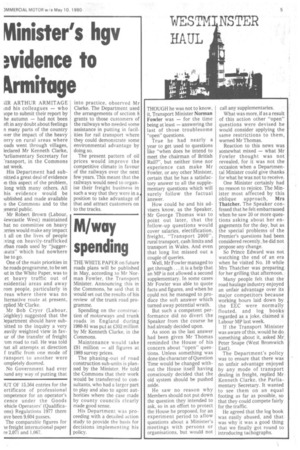THOUGH he was not to know, it, Transport Minister Norman
Page 7

If you've noticed an error in this article please click here to report it so we can fix it.
Fowler was — for the time being at least — answering the last of those troublesome "open" questions. True he had nearly a year to get used to questions like "when does he intend to meet the chairman of British Rail?", but neither time nor experience can make Mr Fowler, or any other Minister, certain that he has a satisfactory answer to all the supplementary questions which will surely follow the factual answer.
How could he and his advisers know, as the Speaker, Mr George Thomas was to point out later, that the ' follow-up questions would cover salaries, electification, freight, "Transport 2000", rural transport, cash limits and transport in Wales. And even that long list missed out a couple of queries.
Well, Mr Fowler managed to get through. .. it is a help that an MP is not allowed a second supplementary. In some cases Mr Fowler was able to quote facts and figures, and when he could not he managed to produce the the soft answer which turned away potential wrath.
But such a competent performance did no divert the Speaker from the course he had already decided upon.
As soon as the last answer had been given Mr Thomas reminded the House of his concern about "open" questions. Unless something was done the character of Question Time would be changed without the House itself having consciously decided that the old system should be pushed aside.
He saw no reason why Members should not put down the question they intended to ask, so in an effort to protect the House he proposed, for an experiment period to allow questions about a Minister's meetings with persons or organisations, but would not call any supplementaries.
What was more, if as a result of this action other "open" questions were devised he would consider applying the same restrictions to them, warned Mr Thomas.
Reaction to this news was somewhat mixed — what Mr Fowler thought was not revealed, for it was not the occasion when a Departmental Minister could give thanks for what he was not to receive.
One Minister certainly had no reason to rejoice. The Minister most affected by this oblique approach, Mrs Thatcher. The Speaker confessed that he felt embarrassed when he saw 20 or more questions asking about her engagements for the day, but as the special problems of the Premier's questions had been considered recently, he did not propose any change.
So Prince Edward was not watching the end of an era when he visited No. 10 while Mrs Thatcher was preparing for her grilling that afternoon.
Many people felt that the road haulage industry enjoyed an unfair advantage over its major competitors because working hours laid down by , the EEC were normally flouted, and log books regarded as a joke, claimed a Labour MP last week.
If the Transport Minister was aware of this, would he do something about it, asked Mr. Peter Snape (West Bromwich East).
The Department's policy was to ensure that there was no unfair advantage enjoyed by any mode of transport dealing in freight, replied Mr Kenneth Clarke, the Parliamentary Secretary. It wanted to see them on an equal footing as far as possible, so that they could compete fairly for the traffic.
He agreed that the log book was easily abused, and that was why it was a good thing, that we finally got round to introducing tachographs.




















































































































